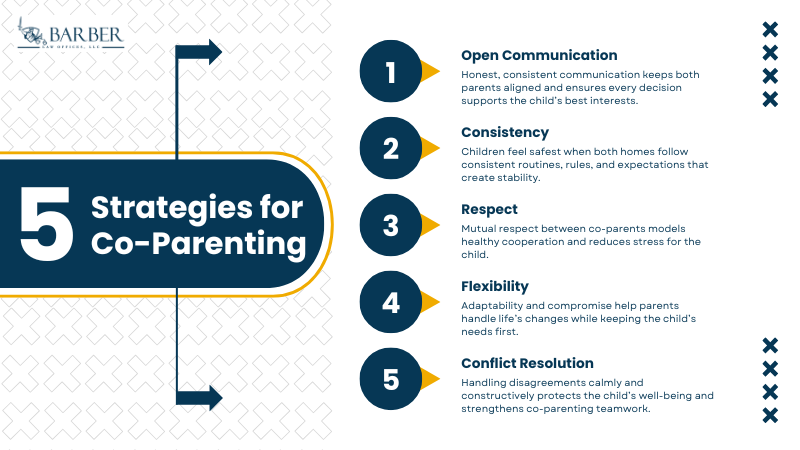The Ultimate Guide to Successful Co-Parenting After Divorce
 When a marriage ends, divorce may be unavoidable, but children don’t have to suffer alongside their parents. Co-parenting after divorce is entirely possible, even when former spouses struggle to get along. This guide, compiled by our experts, explores proven strategies to build a healthy co-parenting relationship and ensure your child’s well-being.
When a marriage ends, divorce may be unavoidable, but children don’t have to suffer alongside their parents. Co-parenting after divorce is entirely possible, even when former spouses struggle to get along. This guide, compiled by our experts, explores proven strategies to build a healthy co-parenting relationship and ensure your child’s well-being.
According to the Centers for Disease Control and Prevention (CDC), about 2.4 out of every 1,000 Americans go through a divorce each year, out of more than two million marriages. Unfortunately, children often become caught in the emotional crossfire. By embracing thoughtful co-parenting strategies, however, parents can help their children maintain strong, positive relationships with both mom and dad.
What Is Co-Parenting After Divorce?
Co-parenting is the shared responsibility of raising children by both parents, even after separation. Its primary focus is the child’s well-being, including making joint decisions about education, health, and emotional development.
Divorce can profoundly disrupt a child’s life, from changes in living arrangements to no longer having both parents under one roof. Successful co-parenting, however, offers stability and security, helping children build self-esteem, experience fewer behavioral issues, and adapt more smoothly socially.
Co-parenting requires teamwork, mutual respect, and cooperation. Unlike parallel parenting, which limits communication and decision-making, co-parenting emphasizes collaboration, respect, and consistency. Various studies conducted by the National Institutes of Health (NIH) show that children with cooperative co-parents are 30% less likely to develop anxiety or behavioral issues than those exposed to high-conflict separation
Read More: Children and Divorce: Co-Parenting vs. Paralell Parenting
Supporting Children Through Divorce
Children often blame themselves when parents separate. To support them:
- Reassure them that they are not at fault and are loved by both parents.
- Validate their emotions; sadness, anger, or silence is normal.
- Maintain consistent routines across both households, including meals, homework, and bedtime.
- Give children a voice in small decisions, such as arranging their room or choosing dinner options.
Creating a stable environment fosters security and emotional resilience during this transitional period.
Key Strategies for Effective Co-Parenting

Successful co-parenting requires intention, patience, and cooperation. By adopting key strategies, parents can create a supportive environment that promotes their child’s well-being and emotional stability, even after divorce.
Open Communication
Effective co-parenting begins with regular and honest communication. Keeping each other informed about your child’s schedule, milestones, and any concerns fosters trust and minimizes misunderstandings. Whether through phone calls, texts, emails, or co-parenting apps, clear communication ensures both parents stay on the same page and work toward the child’s best interests.
Consistency
Children thrive on stability, and maintaining consistent routines, rules, and expectations across both households is essential. Consistency helps children feel secure, reduces confusion, and reinforces positive behaviors. Coordinating schedules, bedtime routines, and discipline approaches can make transitions between homes smoother and less stressful.
Respect
Respecting each other’s parenting styles and decisions is crucial for a successful co-parenting relationship. Even when approaches differ, acknowledging your co-parent’s perspective models cooperation for your child and reduces tension. Avoid undermining or criticizing each other in front of the child, as this can lead to loyalty conflicts and emotional stress.
Flexibility
Life is unpredictable, and effective co-parents know how to adapt to unexpected changes. Flexibility, whether accommodating schedule adjustments, extracurricular activities, or family emergencies, demonstrates cooperation and helps children feel supported in both homes. Being open to compromise ensures the child’s needs remain the priority.
Conflict Resolution
Disagreements are inevitable, but how they are handled makes all the difference. Address conflicts constructively, focusing on problem-solving rather than blame. Utilizing calm discussions, setting boundaries, or seeking mediation when necessary helps prevent disputes from affecting the child and reinforces a cooperative co-parenting environment.
Practical Tools for Co-Parents
- Parenting Plans: A parenting plan should outline living arrangements and daily schedules. Some visitation schedules involve alternating weekends or a 2-2-3 schedule where the child spends two days with one parent, two days with the other parent, and three days with the first, switching the following week.
- Business Approach to Communication: When tensions are high, utilize a business approach to co-parenting. The “business” is the well-being of the child. Use short, factual emails that focus on the child’s current and future needs. Limit emails to two brief paragraphs covering logistics, like scheduling, or to ask questions.
- Conflict Resolution Worksheets: Rely on conflict resolution worksheets to manage the important aspects of raising a child as co-parents. These worksheets emphasize speaking with “I” statements, focusing on the problem rather than the ex, and using reflective listening. Co-parents also learn when to take time out amid arguments.
When to Seek Professional Help
Ex-spouses who constantly fight, refuse to cooperate, or experience difficulty communicating should consider professional mediation or therapy. Professional mediation is beneficial when the child exhibits behavioral problems or when their safety is a concern. Co-parenting counseling is another form of support.
Co-parenting counselors and mediators are numerous. Start the search by referring to online therapist directories or see which counselors are covered by an insurance plan. The local courthouse offers a list of mediators, and the state bar association can be another valuable resource.
Read More: What Does a Divorce Mediator Do? Roles, Process & What To Expect
 Get Support From Our Expert Family Attorneys
Get Support From Our Expert Family Attorneys
Successful co-parenting ultimately leads to the happiness of the child. But if an ex-spouse is constantly attempting to damage their child’s relationship with the other parent, it may be time for legal intervention. Also seek legal advice when the other parent fails to follow court orders.
Divorce involves many complexities, one of which is how to best raise the child in the aftermath. If you experience constant difficulties with co-parenting after divorce, it’s helpful to consult a divorce attorney for legal advice. Barber Law Offices, LLC, is here to make your family’s journey smoother.
Our child custody attorneys are available to help resolve parental responsibility disputes. We have years of experience handling child custody cases and are highly knowledgeable about Illinois laws that impact court outcomes. Our focus is to promote the well-being of your child.
The divorce attorneys at Barber Law Offices are prepared to represent you fairly and ensure your rights are protected. Our reputable law firm serves Schaumburg, IL, and the nearby areas of Cook, Lake, McHenry, Kane, and DuPage Counties with dedication. Schedule a free consultation with our office and give your child the stability and security they deserve.
Co-Parenting Frequently Asked Questions (FAQs)
What if the rules are different between parents?
It’s normal for each parent to have slightly different rules and routines. The key is to communicate these differences clearly to your child and establish consistent boundaries. Emphasize expectations and consequences in both homes, so your child knows what is expected while maintaining a sense of stability.
What if parents disagree on major decisions?
Disagreements over significant decisions, such as education, healthcare, or extracurricular activities, are common. Including a dispute resolution process in your parenting plan can help guide these situations. Approach joint decisions with open communication, active listening, and a focus on finding solutions that prioritize your child’s best interests.
What if parents fail to get along?
Even when co-parents struggle personally, it’s crucial to keep the child’s well-being at the forefront. Maintain a child-centered approach by communicating respectfully, avoiding conflicts in front of the child, and focusing on what’s best for them. Professional mediation or co-parenting counseling can also help reduce tension and create a more cooperative environment.
Allen Gabe is an experienced Illinois attorney specializing in family law, bankruptcy, and real estate matters. With over 50 years of experience, he has helped countless clients navigate divorce, child custody, debt relief, and complex legal challenges with compassion and expertise. Recognized for his dedication, Allen has received multiple awards for client satisfaction and is an active member of professional and community organizations in the Chicago suburbs.

 Get Support From Our Expert Family Attorneys
Get Support From Our Expert Family Attorneys